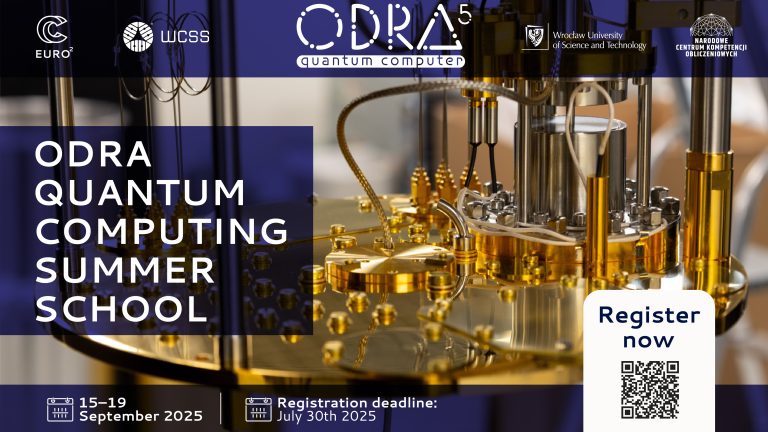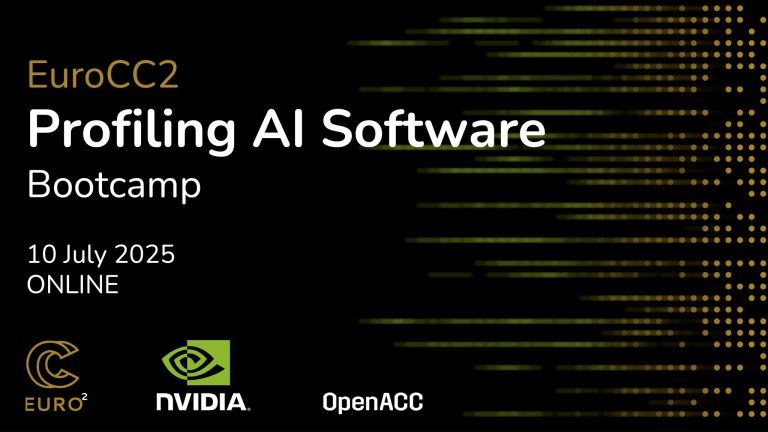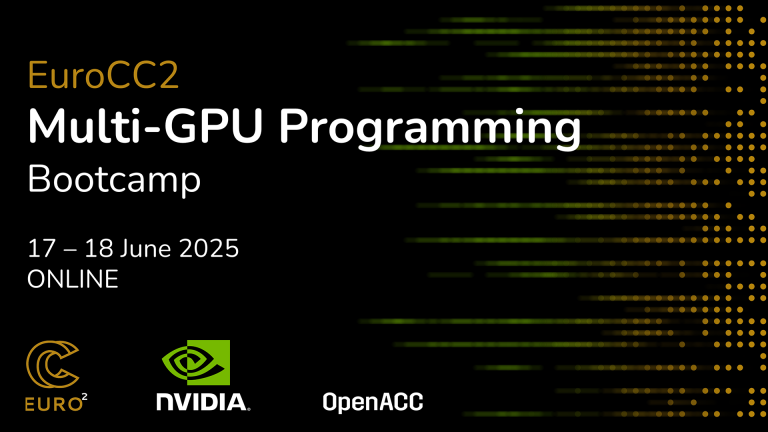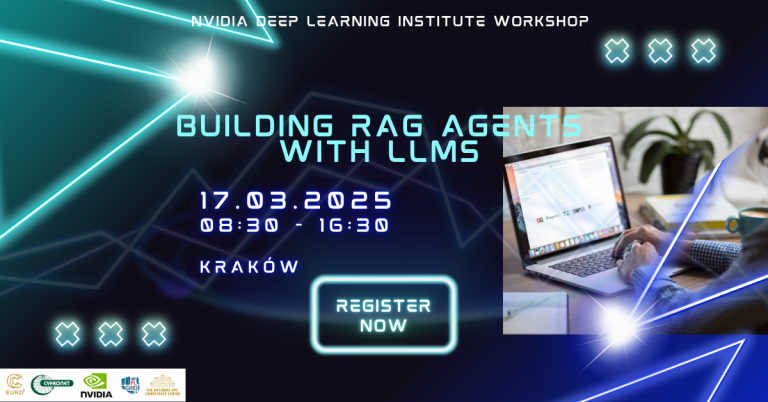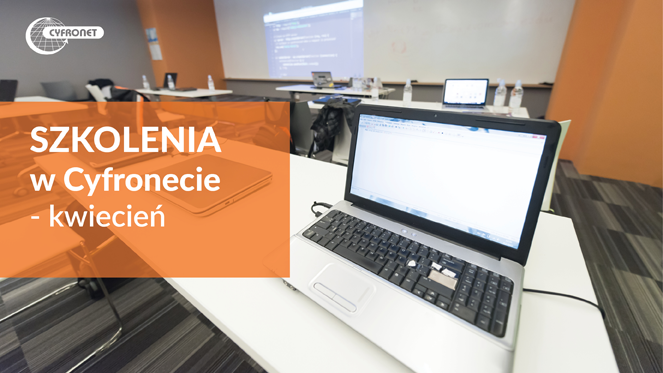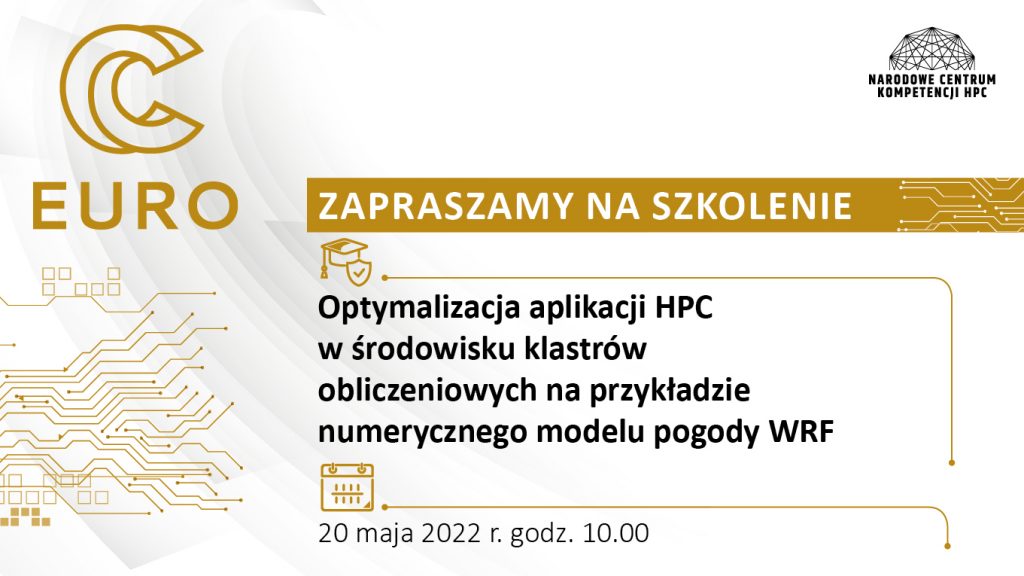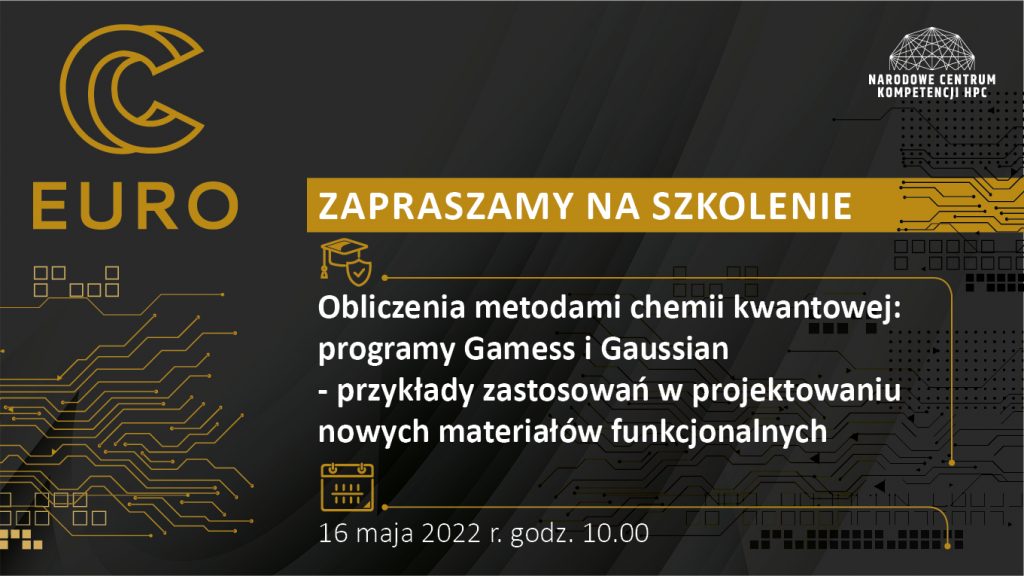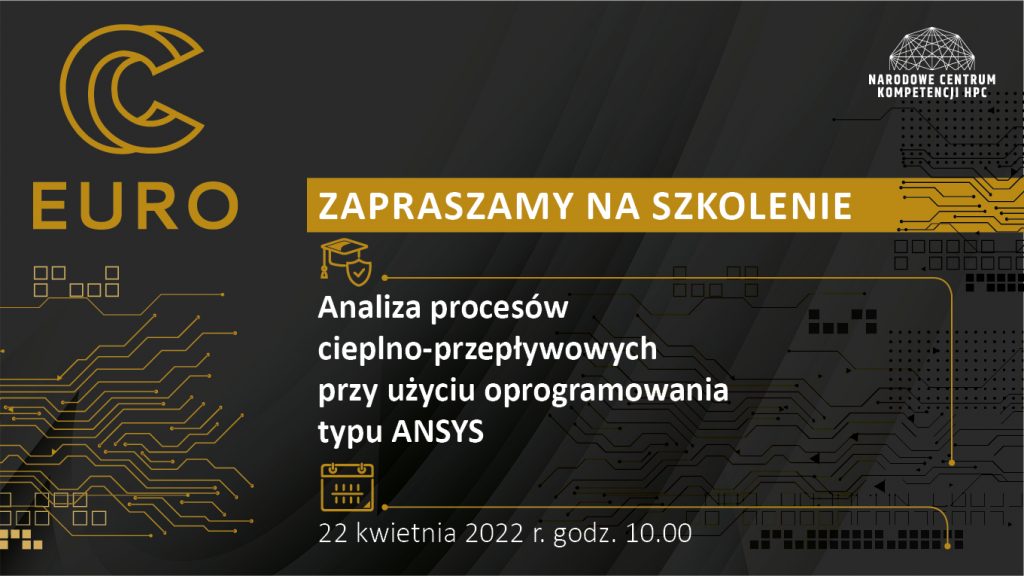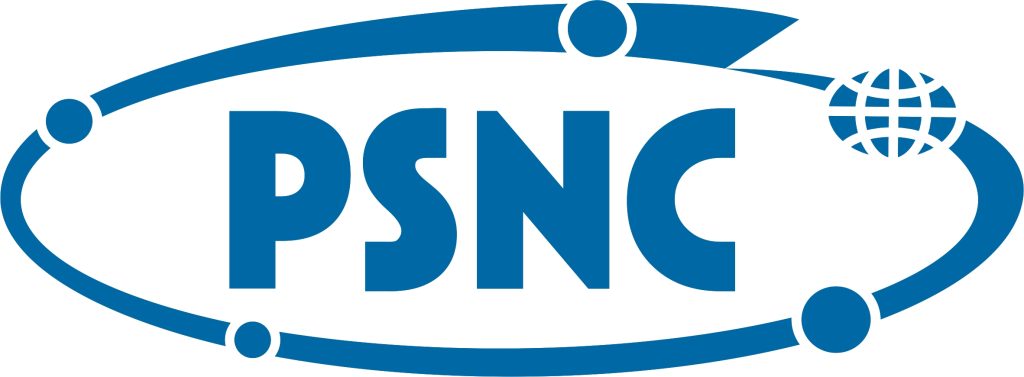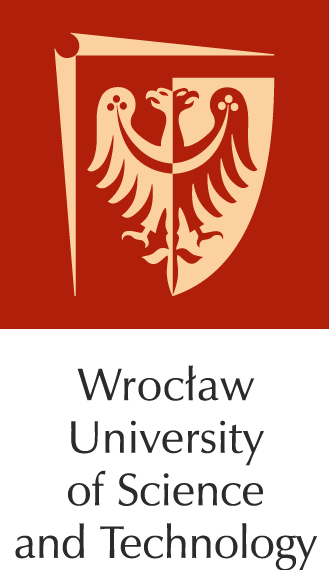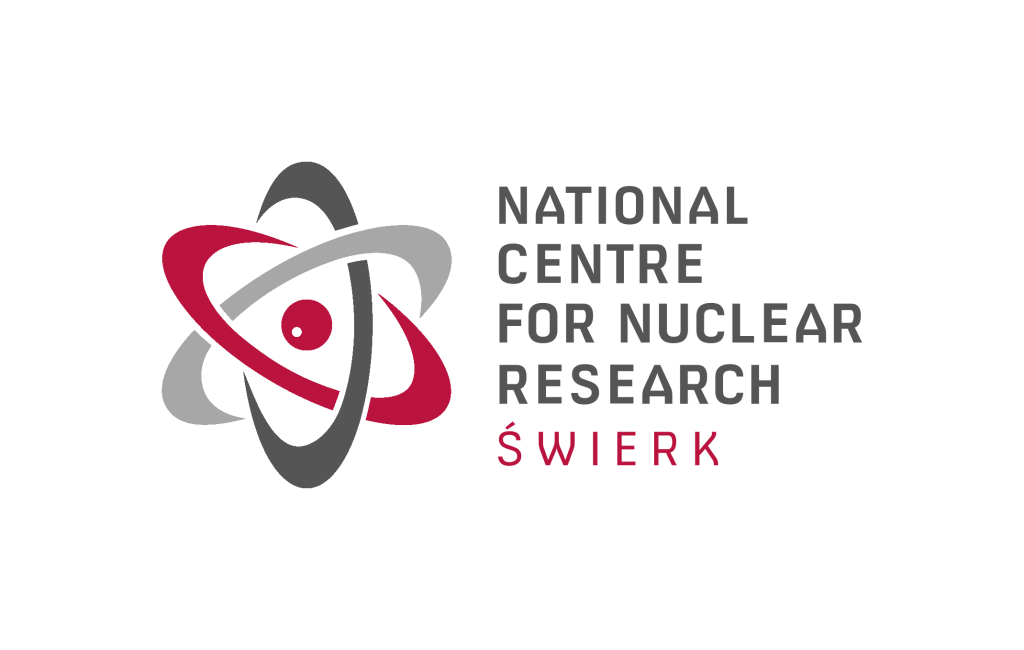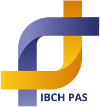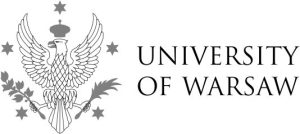Here you will find offers of Polish supercomputing centres’ HPC training courses for users of different levels of expertise. From beginner courses to experts.
Odra Quantum Computing Summer School
13/06/2025
Join the Odra Quantum Computing Summer School, organized within the EuroCC2 project.
Date: September 15–19, 2025
Format: On-site (Wrocław University of Science and Technology)
Language: English
About the event:
Quantum computing is one of the most exciting and fast-evolving fields in modern science and technology. It promises revolutionary breakthroughs in optimization, cryptography, machine learning, materials science, and beyond. However, entering this domain requires a solid foundation in quantum theory, familiarity with emerging hardware platforms, and experience with quantum programming and hybrid algorithms.
Odra Quantum Computing Summer School is a five-day intensive program designed to guide participants through the theoretical fundamentals and practical applications of quantum computation. From foundational mathematics and physical models, through quantum gate operations and hardware architectures, to optimization algorithms and quantum-enhanced machine learning.
Highlights of the Program
♦ Lectures by leading scientists and professionals from academia and quantum industry.
♦ Hands-on laboratory sessions with real quantum software and cloud-accessible hardware.
♦ Live sessions from top companies: IQM and NVIDIA.
♦ Lectures on quantum optimization and quantum-enhanced machine learning.
♦ Collaborative Quantum Hackathon – test your skills and creativity in a team-based challenge.
♦ A blend of mathematics, physics, computer science and engineering.
Prerequisites: Basic knowledge of linear algebra, quantum physics, and programming fundamentals.
Registration deadline: July 30, 2025
Seats are limited!
"Profiling AI Software" Bootcamp
11/06/2025
We welcome you to participate in a training course organized as part of the EuroCC2 and EuroCC4SEE projects.
Date: 10 July 2025
Format: Online (Zoom + Slack)
Language: English
Course Description:
Together with NVIDIA and our European HPC partners, we are organising an intensive one-day bootcamp focused on profiling and optimising AI applications on high-performance computing (HPC) systems. The course is aimed at participants from academia, industry, and public administration in EU Member States and Horizon 2020 Associated Countries.
The course will cover:
♦ Introduction to NVIDIA Nsight Systems
♦ Performance analysis of AI applications in HPC environments
♦ Identifying and resolving bottlenecks
♦ Understanding multi-GPU and multi-node architectures
♦ Hands-on sessions on a real GPU supercomputer
♦ Live Q&A sessions with the instructor
Prerequisites:
Basic experience in Python programming and familiarity with PyTorch distributed training. The course is designed for intermediate-level participants.
Instructor: Tosin Adesuyi, NVIDIA
Moderators: Experts from European HPC centers.
Application deadline: 16 June 2025
Notification of acceptance: 1 July 2025
Limited number of spots available!
We warmly invite you to join this hands-on training event!
Multi-GPU Programming Bootcamp
12/05/2025
Date: June 17–18, 2025
Format: Online (Zoom + Slack)
Language: English
Training description:
In cooperation with NVIDIA and the Academic Computer Centre CYFRONET AGH, we are organizing an intensive two-day course focused on multi-GPU programming. The bootcamp is intended for participants from academia, industry, and the public sector in EU Member States and Horizon 2020 associated countries.
During the training, participants will learn the basics of working with multiple GPUs as well as best practices for optimizing applications in HPC environments. The course will be delivered by an NVIDIA expert and includes hands-on exercises using real hardware – A100 accelerators – available on CYFRONET’s supercomputer.
The training program includes:
– Multi-GPU programming (N-Ways model)
– Step-by-step performance optimization
– Profiling analysis and bottleneck elimination
– Remote hands-on work on real GPU hardware (A100)
– Live Q&A sessions with the instructoreurocc@cyfronet.pl
Prerequisites:
Basic knowledge of parallel programming. The training is designed for participants at the beginner level.
Instructor: Paul Graham, NVIDIA
Moderators: Marta Maj and Klemens Noga, ACK CYFRONET AGH & EuroCC Poland
Registration deadline: May 19, 2025
Notification of acceptance: June 2, 2025
Limited number of places available!
On-site training „Building RAG Agents with LLMs”
07/03/2025
Join the NVIDIA Deep Learning Institute Workshop!
Date: March 17, 2025, 8:30 AM – 4:30 PM
Location: Kraków, Manggha Museum of Japanese Art and Technology
Format: In-person
Language: English
Are you eager to explore the power of RAG agents and Large Language Models?
Looking for hands-on knowledge on building intelligent systems using LLMs? This workshop is for you!
During this full-day session, you will:
– Learn advanced LLM orchestration techniques and dialogue management
– Discover how to effectively use LangChain, Gradio, and LangServe
– Implement information retrieval and semantic similarity
– Earn an NVIDIA Deep Learning Institute certificate
Technical requirements:
Intermediate Python skills and basic knowledge of deep learning. Participants should bring their own laptops. The course is accessed via a web browser, with no need for local software installation.
Instructor: Szymon Mazurek, Cyfronet
This is an in-person event only. Please register only if you can attend in Cracow.
We look forward to seeing you there!
LLM for private data
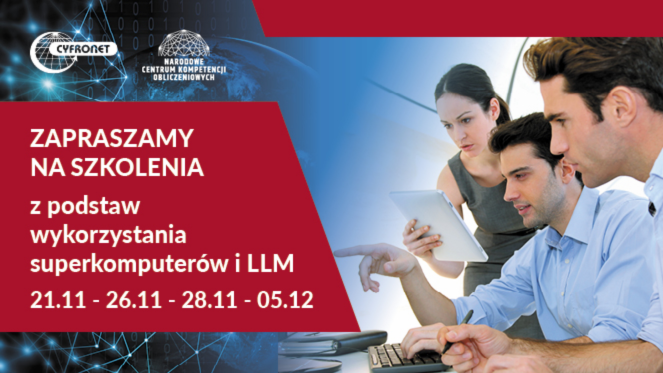

We invite you to attend the training LLM for private data which will take place on
28 November 2024.
This training focuses on the possibilities of utilizing large language models (LLMs) for interacting with private data. It introduces tools that harness the generative power of artificial intelligence in scenarios where data cannot leave the private environment at any point. The training covers the architecture and data requirements for creating a private ChatGPT, leveraging an understanding of the semantics of defined problems while maintaining control over private data.
Register here.
LUMI workshop 2024
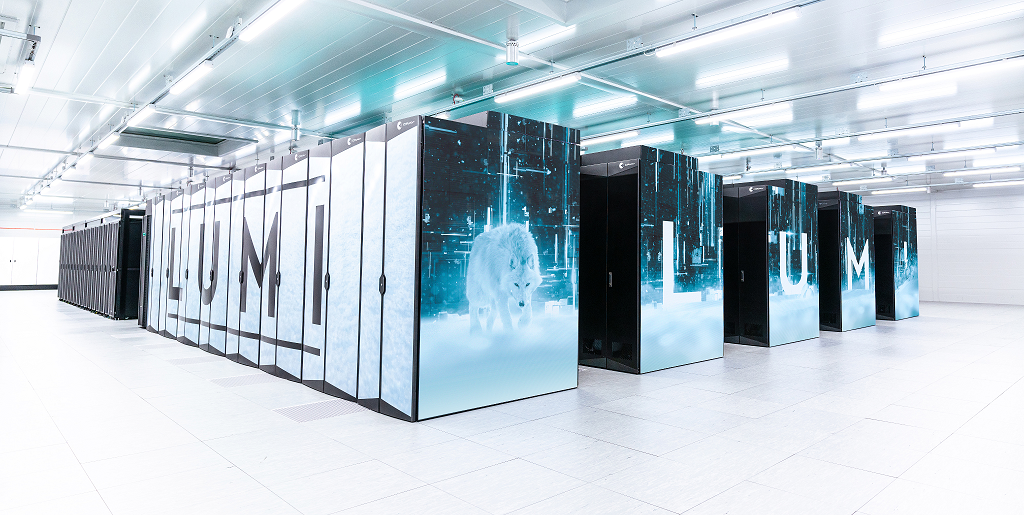

On June 3, 2024, from 10:00 a.m. to 4:00 p.m. in Warsaw, we are organizing a workshop “Accelerating your computing with the LUMI European supercomputer”.
LUMI is one of the largest European supercomputers and flagship EuroHPC systems. More information on Polish activities under LUMI can be found here. Polish scientists have access to LUMI via national PLGrid Infrastructure.
The program includes:
● Using machine learning frameworks on LUMI
● Working with large language models using Megatron-DeepSpeed on LUMI.
The event will be held in Warsaw, at the Centrum Szkoleniowe Wspólna, 56 Wspólna st.
Poland N-Ways to GPU Programming Bootcamp
We would like to invite you to the “N-Ways to GPU Programming” workshop organized on June 5-7, 2024 by the Academic Computer Centre Cyfronet AGH in cooperation with PLGrid Infrastructure, Polish National Competence Centre in HPC, and NVIDIA.
The bootcamp covers the basics of GPU programming and provides an overview of different methods for porting scientific applications to GPUs using NVIDIA® CUDA®, OpenACC, standard languages, OpenMP offloading. Throughout the bootcamp, attendees with learn how to analyze GPU-enabled applications using NVIDIA Nsight™ Systems and participate in hands-on activities to apply these learned skills to real-world problems.
A detailed programme for the event and an application form (deadline 15 May 2024) can be found here.
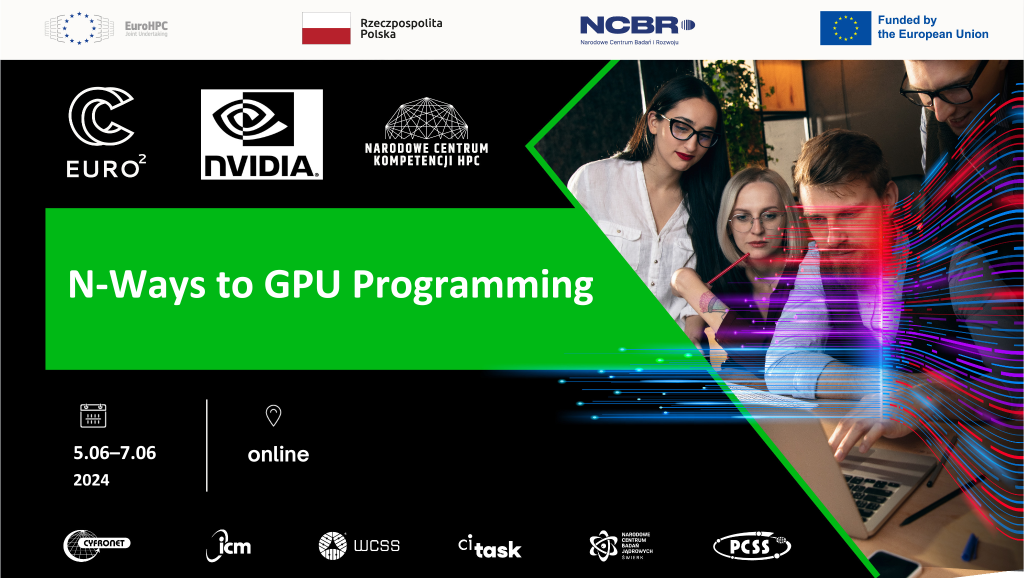
Poland End to End LLM Bootcamp
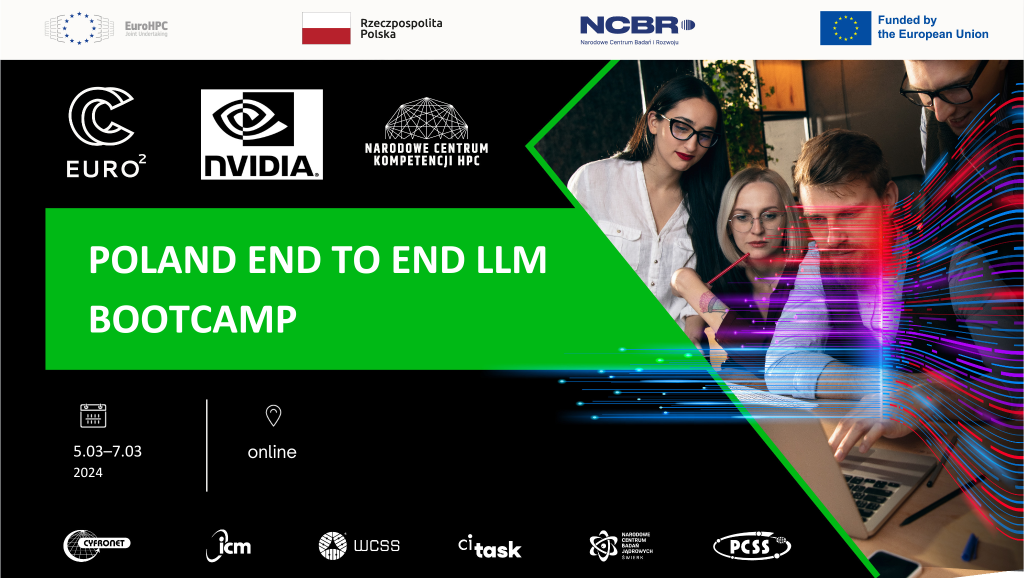
We would like to invite you to the Poland End to End LLM Bootcamp organised from 5-7 March 2024 by the Academic Computer Centre Cyfronet AGH in cooperation with PLGrid Infrastructure, Polish National Competence Centre in HPC, and NVIDIA company.
This bootcamp is designed to give NLP researchers an end-to-end overview on the fundamentals of NVIDIA NeMo framework, complete solution for building large language models. It will also have hands-on exercises complimented by tutorials, code snippets, and presentations to help researchers kick-start with NeMo LLM Service and Guardrails.
Training from resources of Cyfronet
Trainings on the use of resources of supercomputers was organised by Cyfronet in December 2023.
The workshop provided insight into the basics of using the supercomputers and facilitated their effective use in scientific work. The programme included three workshops. For a detailed programme, just click on the topic:
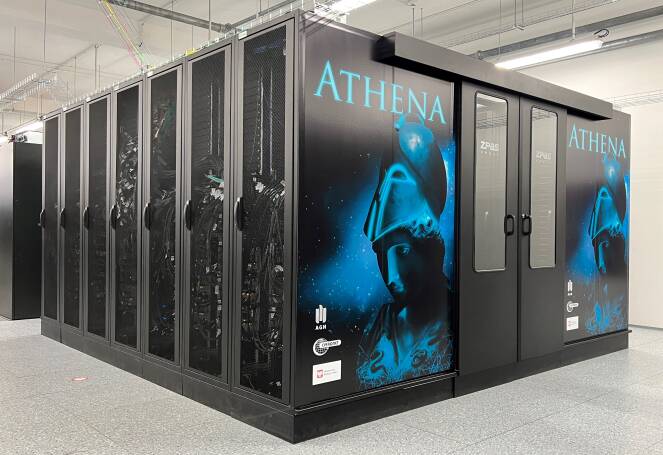
The Cyfronet – Intel oneAPI workshop
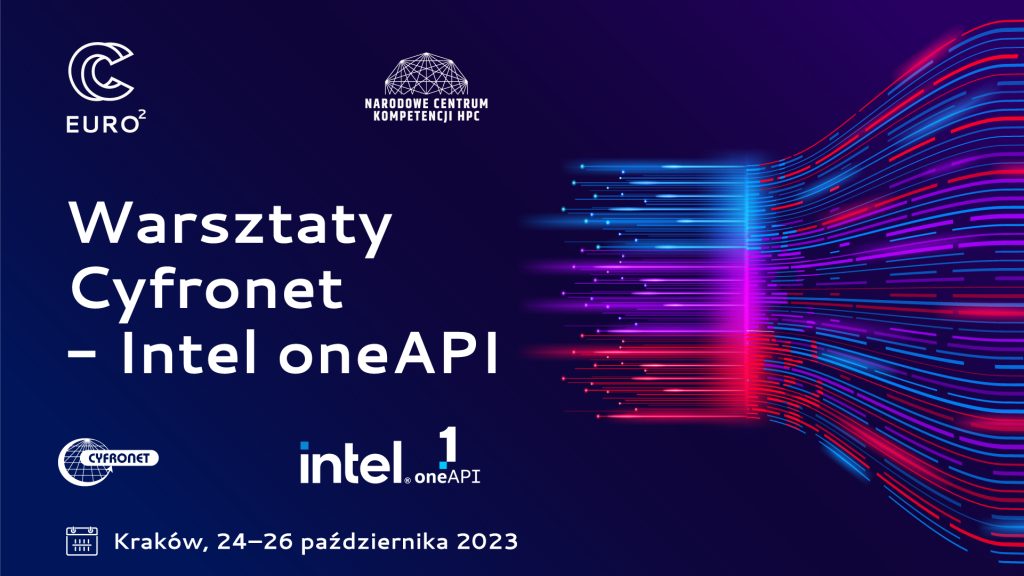
The Cyfronet – Intel oneAPI workshop was held on October 24-26, 2023 in Krakow, Poland.
Each day was dedicated to a different area:
– Tuesday, October 24: Programming with oneAPI
– Wednesday, October 25: Performance Libraries and Profiling
– Thursday, October 26: OpenMP Offloading & MPI.
The classes were led by Intel oneAPI certified instructors. The event was free of charge.
Comprehensive general LUMI course
Comprehensive general LUMI course was held on October 3-6, 2023 in Warsaw.
This four-day course provided a comprehensive introduction to the LUMI architecture and programming environment. It included lessons on compiling and using software, programming models (HIP and OpenMP offload), porting, executing jobs, and optimising applications to run on AMD MI250X. After completing the course, participants were able to work efficiently on both the CPU (LUMI-C) and GPU (LUMI-G) partitions.
The course was free of charge. It was jointly conducted by experts from z LUMI HPE Centre of Excellence (HPE CoE), AMD and LUMI User Support Team (LUST).
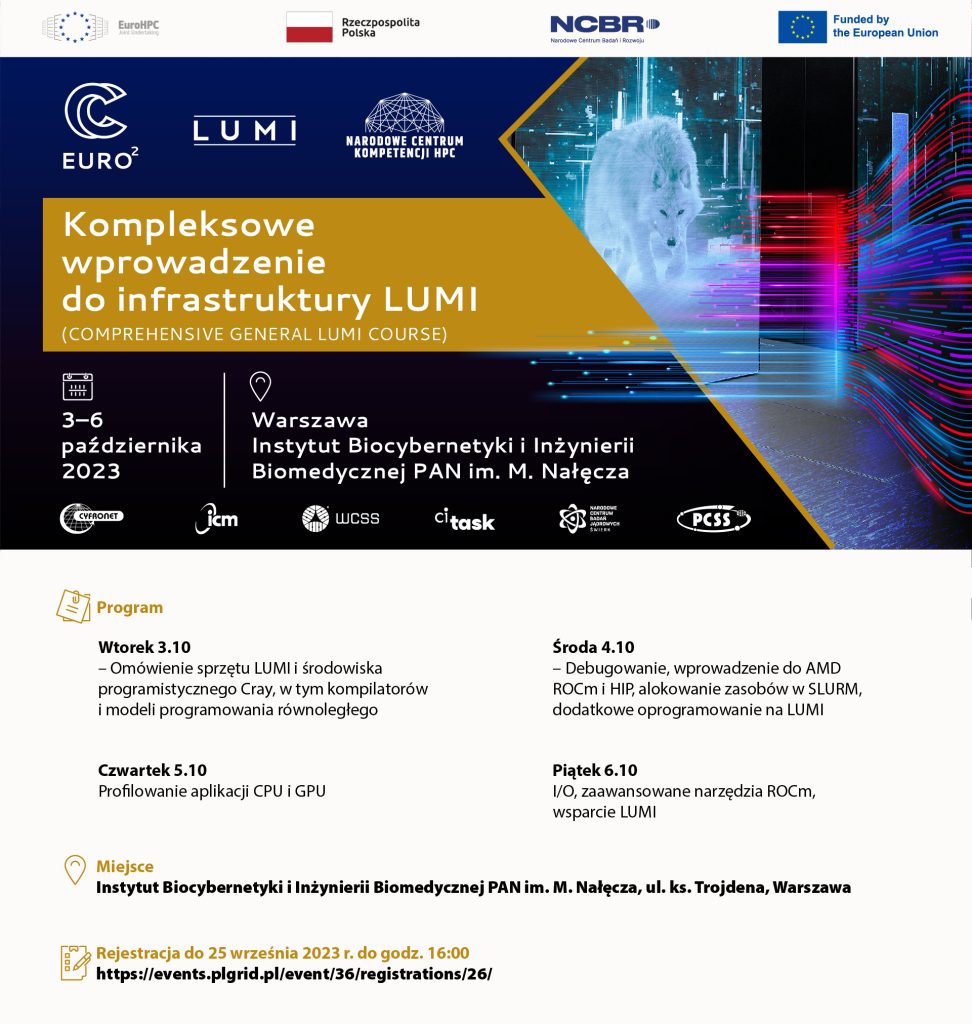
Cyfronet AI for Science Bootcamp

During this online bootcamp, participants were learning how to apply AI tools, techniques, and algorithms to real-life problems. They were studying the key concepts of Deep Neural Networks, how to build Deep Learning models, and how to measure and improve the accuracy of their models. They also learned essential data preprocessing techniques to ensure a robust machine learning pipeline. This online bootcamp was a hands-on learning experience in which participants were guided by step-by-step instructions with mentors on hand to help throughout the process.
Training: System GNU/Linux: Bash shell, utility programs
The meeting’s agenda covered topics such as Unix family operating systems, elements of the GNU/Linux environment, Bash shell, including script creation and execution, the pipeline concept, and tools such as grep, sed, cut, rsync, scp, find. There was also a practical session.
The training was conducted as part of a programme EuroCC2 and was carried out in the Polish language.
Training: Simulation as the Key to Innovation – Applications of Ansys Software
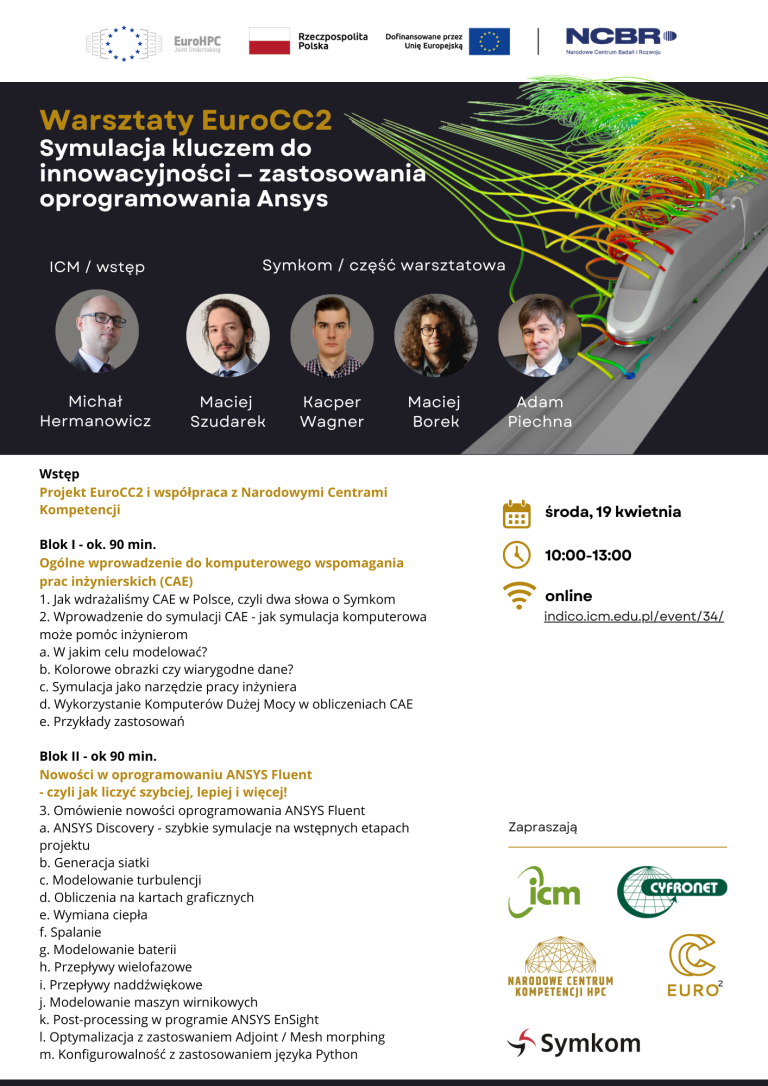
The training „Simulation as the Key to Innovation – Applications of Ansys Software” took place online on April 19, 2023, and was conducted by representatives of the company Symkom: Maciej Borek, Adam Piechna, Maciej Szudarek, Kacper Wagner and Interdisciplinary Centre for Mathematical and Computational Modelling UW (ICM) Michał Hermanowicz.
The three-hour session focused on the use of numerical simulations to solve engineering and research problems. In the first block, the presenters, drawing from their implementations and experiences, discussed the purpose of applying computer simulations and how they can assist engineers in their daily work. They covered topics such as flow modelling, mechanical and electromagnetic analyses, and explained the role of utilising supercomputers in simulations.
In the second block, participants had the opportunity to explore the latest capabilities of ANSYS software in the context of flow analysis. Enhancements in the mesh generation process, turbulence modelling, GPU computations, and a range of other issues were discussed.
The training was organised by company Symkom in cooperation with ICM, Academic Computer Centre Cyfronet AGH and the National Competence Centre in HPC. It was carried out as part of the EuroCC2 project.
Training from resources of Cyfronet
In April 2023, training sessions on the utilisation of supercomputer resources were held, organised by Academic Computer Centre Cyfronet AGH.
These workshops allowed participants to familiarise themselves with the basics of using the supercomputers installed on Cyfronet and facilitated their effective utilisation in scientific work.
Here are the topics of the individual training sessions:
• April 3: Introduction to the command line of Linux systems and Bash shell
• April 4-5: Efficient scientific computing in C++
• April 11: Introduction to scientific High-Performance Computing
• April 12: Efficient usage of HPC systems in scientific computing
• April 19: Effective utilization of supercomputers in research using machine learning as part of the conference.
How LEPISZCZE was designed and created: A Comprehensive Natural Language Processing Benchmark for Polish. Seminar.
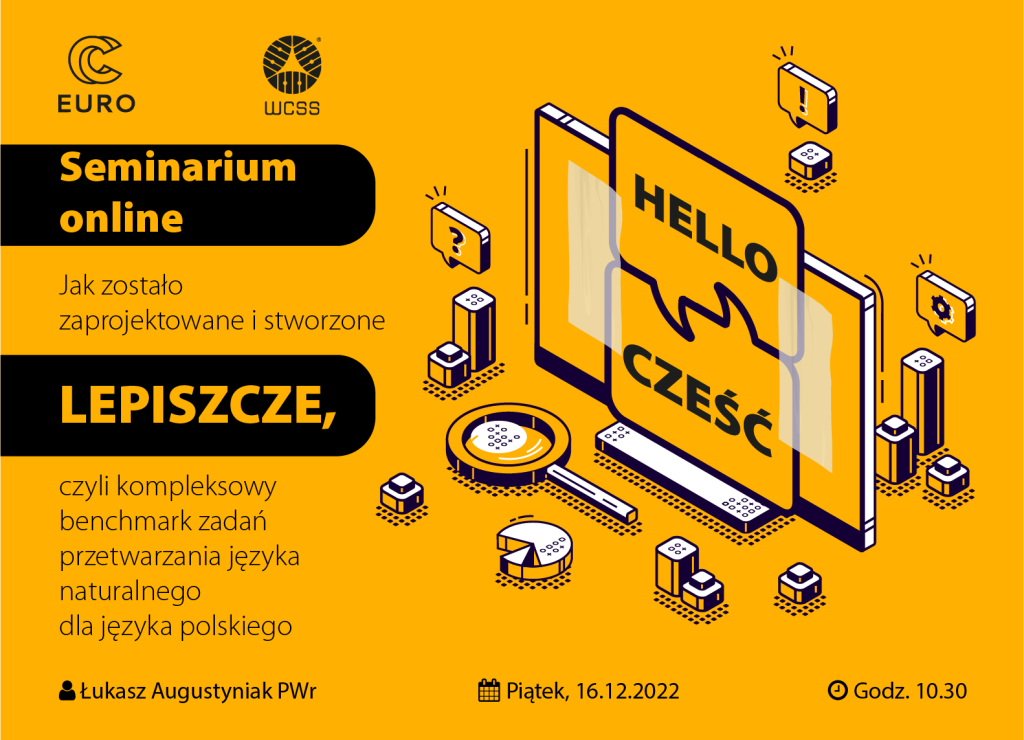
After addressing medical topics, it was time to dive into linguistic issues. The next seminar in the AI/BigData series took place on Friday, December 16, 2022. This time, Łukasz Augustyniak from Wrocław University of Science and Technology explained how LEPISZCZE was designed and created – a comprehensive benchmark for natural language processing tasks in Polish.
LEPISZCZE is a new evaluation environment for Polish language technology based on language modelling, featuring a wide range of diverse test tasks. The proposed environment was designed with flexibility in mind, allowing the addition of tasks, introduction of new language models, submission of results, and versioning of data and models.
During the seminar, Łukasz Augustyniak shared experiences and insights gained from working on the development of the LEPISZCZE evaluation environment and provided guidelines for designers of similar environments in other languages with limited linguistic resources.
Machine learning in veterinary medicine.
Seminar 9.12.2022
What does machine learning have in common with veterinary medicine? This was discussed by Szymon Mazurek and Maciej Wielgosz from Academic Computer Centre Cyfronet AGH on Friday, 9 December 2022, during the next seminar of the AI/BigData series.
The lecture, entitled Machine Learning in Veterinary Medicine, dealt with the challenges and lessons learnt by the two scientists in the field of veterinary medicine. These focused on learning deep semantic segmentation models of cytological images and a series of preventive medicine activities. Later tasks included the design and implementation of age classification models and the simulation of canine movement for the noninvasive detection of pathological gait patterns. The specialists also talked about the collection and efficient processing of data using Cyfronet’s HPC infrastructure, mainly in the context of the tools and methods they use.
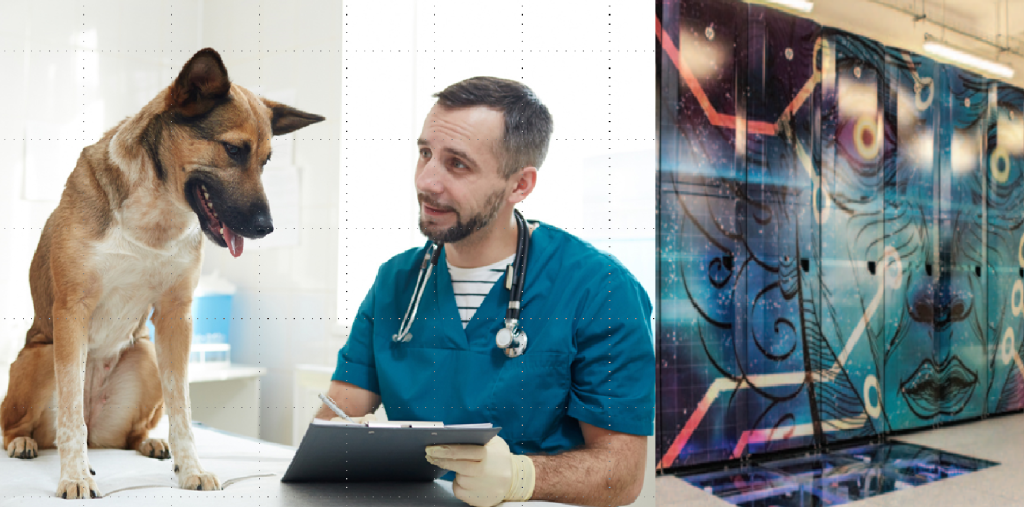
HPDA services at CI TASK. Seminar
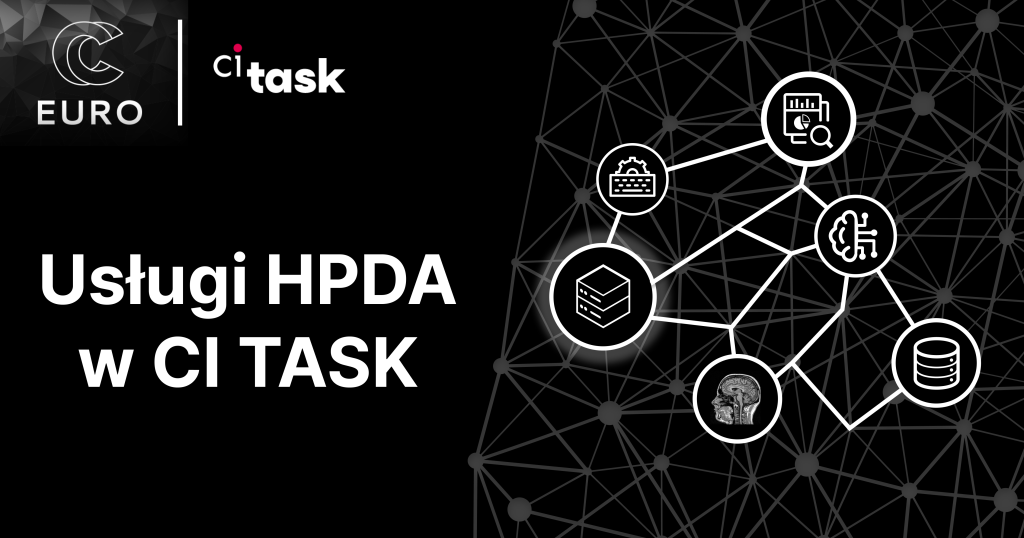
The next seminar in the AI/BigData series took place on Friday 2 December 2022. The topic of the meeting: HPDA services at CI TASK. The presentation outlined the HPDA tools currently under development at CI TASK, in particular the interactive data analysis platform. Among the solutions it offers are: access to distributed data processing engines (Apache Spark, DASK), a graphical user interface with support for data visualisation (JupyterLab + plug-ins), a container queuing system for long-running computing, and support for distributed machine learning. Additionally, real-world use cases of the platform, concerning histopathology data visualisation and statistical data collection tools for COVID-19 pandemic research, were presented.
Training: Introduction to Parallel Programming: MPI
A training session was held on Thursday 12 December 2022, hosted by Maciej Szpindler from the Interdisciplinary Centre for Mathematical and Computational Modelling UW.
This was the second meeting in a series of training sessions on the parallel programming elements and infrastructure of the LUMI project. In this part, participants were introduced to a programming model for distributed memory architecture using the message passing interface (MPI). The lecture part was complemented by a practical session during which the audience had the opportunity to apply the discussed issues themselves.

Seminar: AI in medicine. From classification to generative modelsh
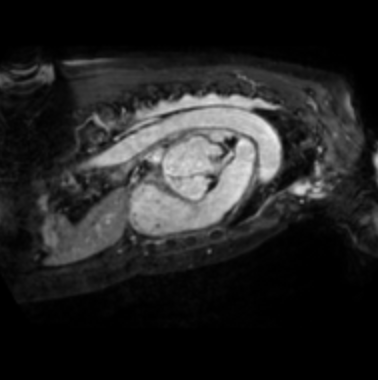
AI in medicine: From Classification to Generative Models, that was the theme of the next seminar in the AI/Big Data series, conducted on Friday, November 18, 2022.
AI models have found various applications in medicine. The aim of the presentation by Marek Justyna from Poznan Supercomputing and Networking Centre was to showcase exemplary scenarios of using AI models for processing medical imaging data (X-ray and CT). The sample scenarios included classification, segmentation, and transformation using generative models. The presentation covered issues related to the specificity of the data, methods of preprocessing, and techniques for evaluating the quality of solutions.
Training: Introduction to Parallel Programming: OpenMP
On Thursday, 10 November 2022, a training session was held, led by Michał Hermanowicz from Interdisciplinary Centre for Mathematical and Computational Modelling UW.
This was the first meeting in a series of three training sessions focused on parallel programming elements (OpenMP, MPI) and the LUMI project infrastructure. In this part, participants familiarised themselves with the mechanisms of parallel programmes and the principles of their creation, compilation, and execution in shared memory architecture (OpenMP). The theoretical part was complemented by a practical session during which attendees had the opportunity to independently apply the discussed concepts.

Linear models in practice – modelling the number of deaths depending on smog and weather. Seminar
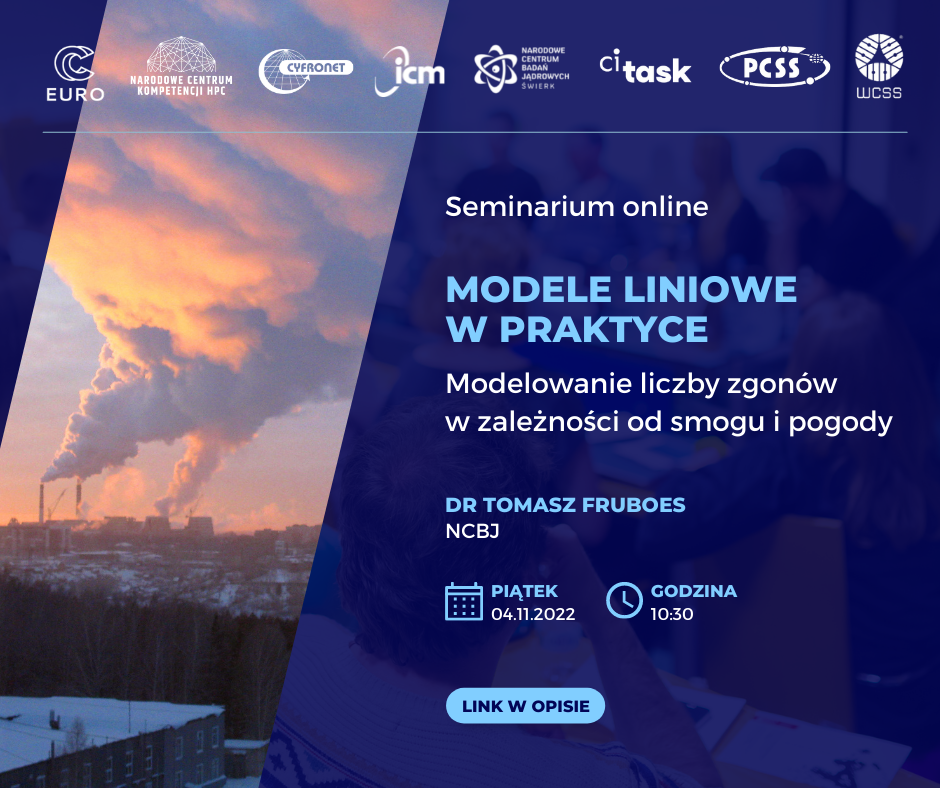
On Friday, November 4, 2022, another seminar took place as part of the AI/BigData series. The topic of the meeting was “Linear Models in Practice – Modeling the Number of Deaths Depending on Smog and Weather.”
In January 2017, a 30% increase in the number of deaths in Poland was observed compared to the previous year. In his presentation, PhD Tomasz Fruboes from National Centre for Nuclear Research showcased an analysis of data related to the number and causes of deaths observed at Bielański Hospital in Warsaw. He demonstrated the application of methods to assess how atypical the observed excess of deaths is. One of these methods involved the use of a generalized linear model to attempt to explain whether low temperatures and high levels of air pollution observed in a given month could account for the excess deaths.
Training: Introduction to Computing on computers ICM
On Thursday, 3 November 2022, a training session was held, led by Michał Hermanowicz from ICM.
Training was designed for both new and experienced supercomputer users. The participants familiarised themselves with the characteristics of the computational resources at ICM, as well as the basics of their utilisation.
The topics covered included submitting tasks to the queue system, application modules, and selected aspects of handling the GNU/Linux system environment. Attendees learnt about available resources such as Topol, Okeanos and Rysy (GPU/PBaran), as well as the principles of accessing them (login, file system operations/copying data, file editing/operations, user applications/system modules, SLURM queue system), and basic instructions.
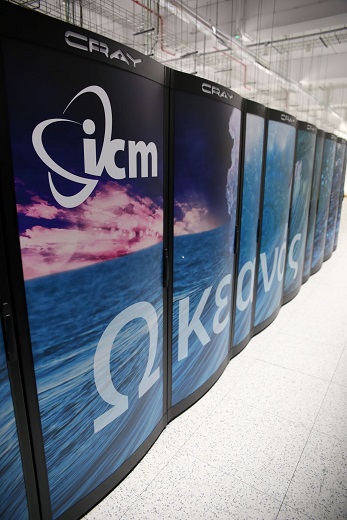
From simple classifiers to convolutional neural networks. Seminar
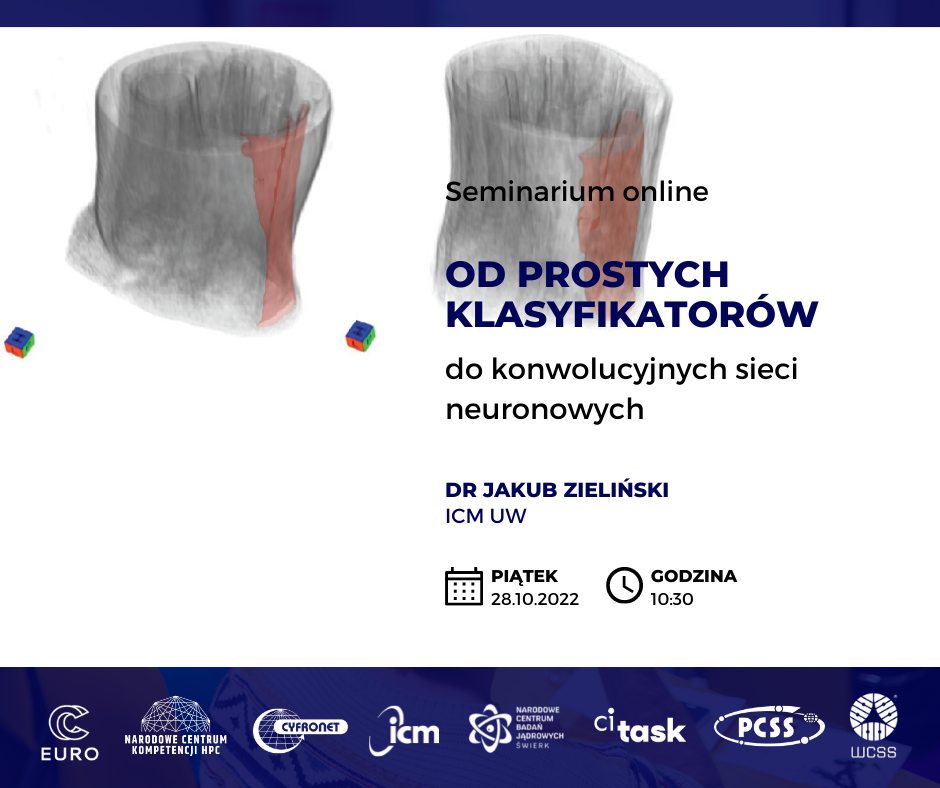
On Friday, 28 October 2022, another seminar from the AI/BigData series was organised. The topic of the meeting, led by PhD Jakub Zieliński from Interdisciplinary Centre for Mathematical and Computational Modelling UW was “From Simple Classifiers to Convolutional Neural Networks.”
In the first part, he discussed basic classifiers used in machine learning, such as KNN, SVM, and the fundamental differences between them. He demonstrated the relationship between SVM and perceptron. In the second part, he presented shallow neural networks (sequential) and their key geometric properties, along with their implications for the capabilities and overfitting risks of the networks. He talked about classifiers based on convolutional neural networks, showcasing typical components of such complex networks. The presentation ended with an overview of several examples of network applications, including the analysis of Achilles tendon magnetic resonance images, and applications in the evaluation of heart and lung function. He discussed generalisations of classical regression with a different penalty function, which are more robust against disturbances caused by the presence of outliers. In addition, he presented examples of applications such as predicting energy or water consumption over time and monitoring pulse changes in the presence of arrhythmias
Seminar: One-Dimensional Models in supervised learning
On Friday, 21 October 2022, a seminar from the AI/BigData series took place. The topic of the meeting was “One-dimensional Models in Supervised Learning.”
During the second presentation, PhD Jakub Zieliński from Interdisciplinary Centre for Mathematical and Computational Modelling UW introduced one-dimensional models in supervised learning. He demonstrated generalisations of classical regression with a different penalty function, which are significantly more robust against disturbances caused by the presence of outliers. He also provided examples of applications, including predicting energy or water consumption over time and monitoring pulse changes in the presence of arrhythmias. He discussed multiple-variable regression, situations where the number of predictors, and thus the fitting parameters, is large compared to the number of observations. He covered two models: LASSO and Elastic-Net. The speaker also spoke about simple classifiers such as logistic regression, KNN, SVM, and perceptron.
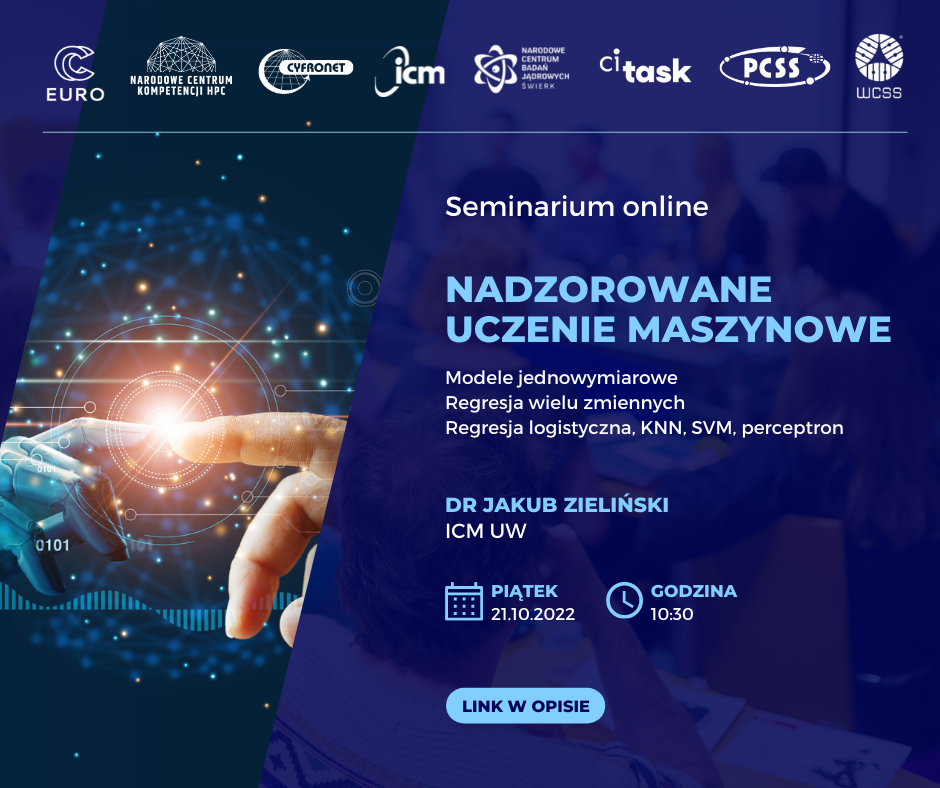
Machine learning in biomedical data analysis. New AI/Big Data seminar series
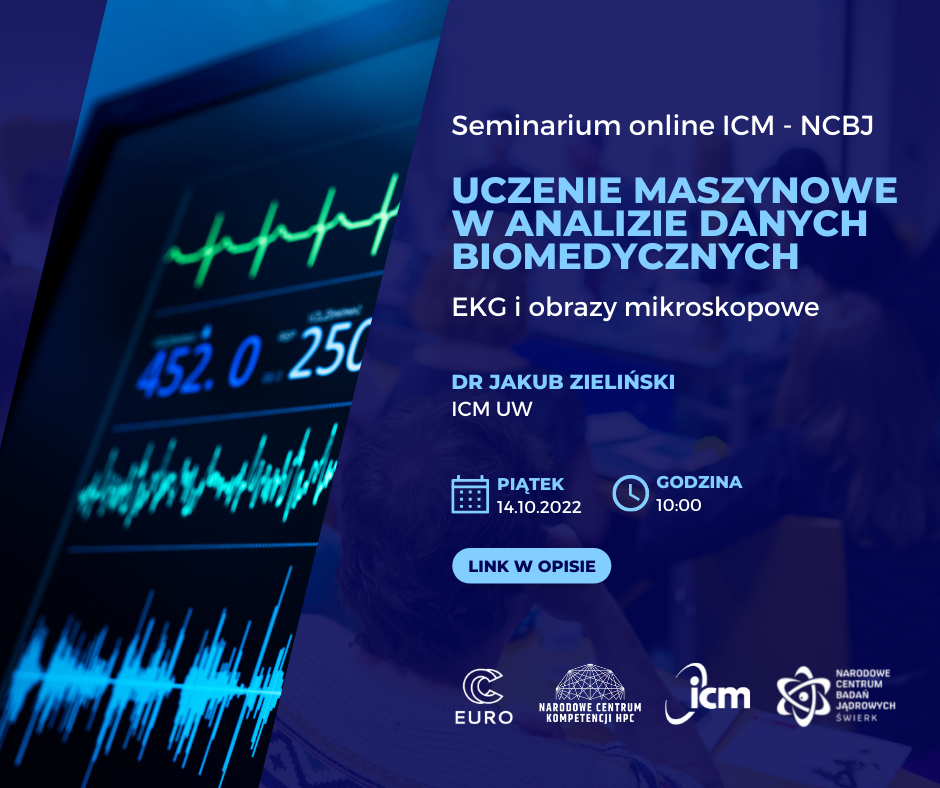
A new series of seminars on topics related to artificial intelligence and large datasets has kicked off. The first session, titled “Machine Learning in the Analysis of Biomedical Data (ECG and Microscopic Images),” was conducted by PhD Jakub Zieliński from Interdisciplinary Centre for Mathematical and Computational Modelling UW on Friday, October 14, 2022.
In the presentation, he discussed the most crucial issues in unsupervised machine learning: dimensionality reduction, separation of overlaid signals, and clustering. Dr. Zieliński also presented the theoretical foundations and examples of machine learning applications in medicine and biology. Participants learnt about various topics, including the analysis of microscopic image analysis, classification of rat locations, and human fetal ECG signals (separation of signals: mother, foetus, and noise).
Training: Basics of parallel programming in OpenMP/MPI
PhD Jakub Zieliński from Interdisciplinary Centre for Mathematical and Computational Modelling UW led a training titled “Fundamentals of Parallel Programming in OpenMP/MPI,” which took place online on June 9, 2022.
The training covered the basics of parallel programming in C/C++ and Fortran using the OpenMP and Message Passing Interface (MPI) standards. Participants familiarised themselves with the mechanisms of parallel programme operation and the principles of their creation, compilation, and execution in shared and distributed memory architectures. The theoretical part of the training was complemented by a practical session during which participants could apply the concepts discussed.
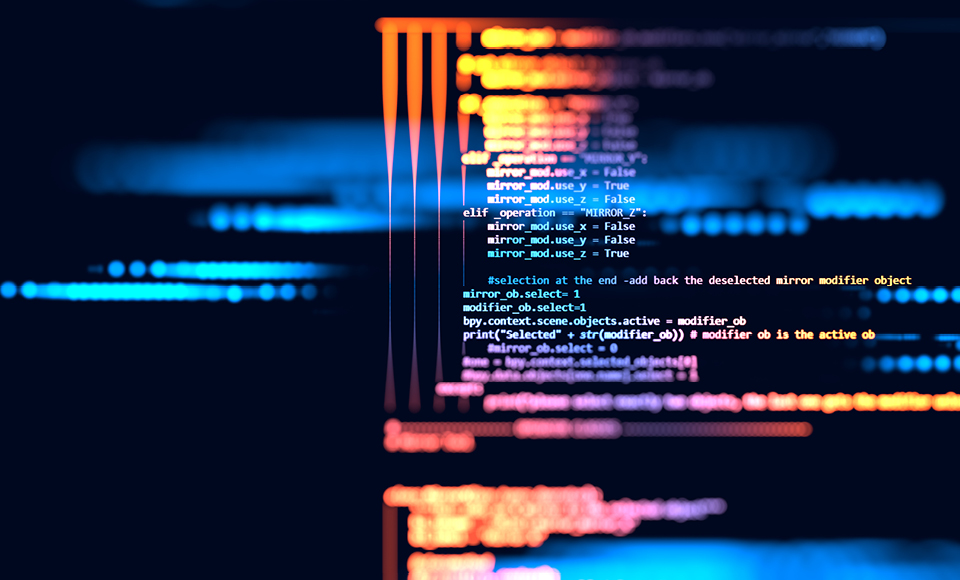
Trainig: DFT calculations (Abinit, Siesta) in an HPC environment

Michał Zieliński from Interdisciplinary Centre for Mathematical and Computational Modelling UW conducted another training session on DFT calculations (Abinit, Siesta) in an HPC environment on May 26, 2022.
The training was aimed at users involved in density functional theory (DFT) computations, particularly those using Abinit and Siesta software packages. The participants in the training were familiarised with the practical aspects of performing DFT calculations in an HPC environment. The instructor discussed examples of electronic structure calculations for semiconductors, their surfaces, and thin layers. The session was conducted in English.
Training: Introduction to the Implementation of physical models using OpenFOAM
Watch the training course entitled Introduction to the implementation of physical models using OpenFOAM, which took place online on 26 May 2022.
In the programme: C++ in OpenFOAM, description of the more commonly used classes in OpenFOAM, implementation of the energy equation in simpleFoam, example of implementation of a boundary condition. The training was led by PhD Przemysław Błasiak Eng., Wrocław University of Science and Technology.
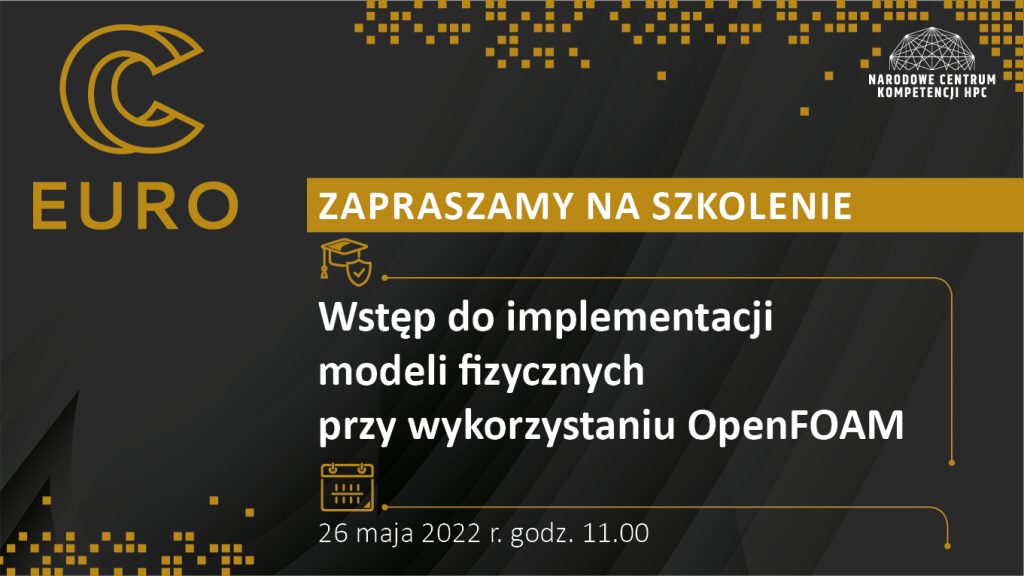
Training: Optimisation of HPC applications in a cluster computing environment using the WRF numerical weather model as an example
We encourage you to watch the recording of the training session titled “Optimisation of HPC applications in a cluster computing environment using the WRF numerical weather model as an example” which took place online on May 20, 2022.
The training was led by Prof. Mariusz Figurski, Gdańsk University of Technology, IMGW. The agenda included an introduction to parallel computing in cluster environments, the design of parallel algorithms focussing on task decomposition, an overview of numerical weather models, their advantages and disadvantages, parallel computing models used in the WRF model, methods of compilation, optimisation, and validation of computations.
The session covered the fundamentals of parallel computing, basics of numerical weather models using the WRF model, implementation of computations in the WRF model, optimisation and validation, as well as benchmarking supercomputers using the numerical weather model WRF.
Training: Quantum Chemistry Calculations: Gamess and Gaussian Programmes: Examples of Applications in Designing New Functional Materials
Training in Quantum Chemistry Calculations: Gamess and Gaussian Programmes: Examples of Applications in Designing New Functional Materials, was conducted online on May 16, 2022.
The lecture was led by PhD. Dsc. Maciej Bobrowski from Gdańsk University of Technology. He presented general ideas of quantum chemistry methods from a practitioner’s perspective and provided examples of their application in designing new functional materials: polymers deposited from the gas phase using the low-pressure chemical vapour deposition (LPCVD) method and liquid thermoelectric materials, as well as the limitations of such methods. He demonstrated an example of using quantum chemistry methods in further designing combined quantum-classical algorithms, which in turn can be utilised for the analysis of larger systems, i.e., those composed of many thousands of atoms.
Training: Introduction to performing numerical calculations using OpenFOAM
We invite you to watch a recording of the training course entitled Introduction to the Implementation of physical models using OpenFOAM, which took place online on 28 April 2022.
OpenFOAM is a free, continuously developed software to create computational fluid dynamics (CFD) simulations. In the programme: C++ in OpenFOAM, description of the more commonly used classes in OpenFOAM, implementation of the energy equation in simpleFoam, and example of a boundary condition implementation. The training was led by Ph.D. Przemysław Błasiak Eng. From Wrocław University of Science and Technology.
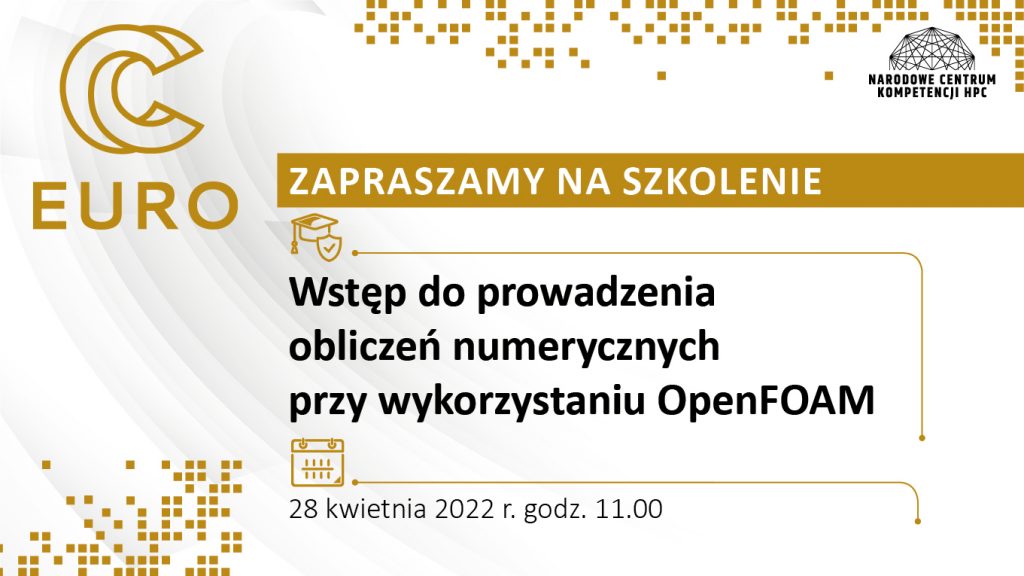
Training: Thermal Fluid Flow Process Analysis using ANSYS software
Training in Thermal Fluid Flow Process Analysis using ANSYS software took place online on April 22, 2022.
Participants were introduced to the practical fundamentals of computational fluid dynamics (CFD). The aim was to present key aspects of simulating physical phenomena related to liquids and gases. The training was led by Ph.D. associate professor Sławomir Pietrowicz Eng, WUST Prof., Ph.D. Przemysław Błasiak Eng., Ph.D. Józef Rak Eng., Wrocław University of Science and Technology. In the first part, basic laws used in numerical simulations of thermal-fluid flow processes were discussed. The topics covered in the practical part included preparation of three-dimensional geometry, discretization and numerical grids, programming computations, boundary conditions, numerical solver operation, result processing, visualisation and interpretation, optimization of the studied system, and practical conclusions from the conducted simulations.
Training: DFT calculations (Abinit, Siesta) in an HPC environment
Training in DFT calculations (Abinit, Siesta) in an HPC environment, targeted at users working in the field of density functional theory (DFT), especially with the use of Abinit and Siesta programs, took place on April 7, 2022.
Michał Hermanowicz from Interdisciplinary Centre for Mathematical and Computational Modelling UW acquainted participants with selected aspects of computational practices in the HPC environment. They demonstrated examples of electronic structure calculations for semiconductor materials, their surfaces, and thin layers.

Training: OpenFOAM - Computational Fluid Dynamics (CFD) Numerical Simulation Software
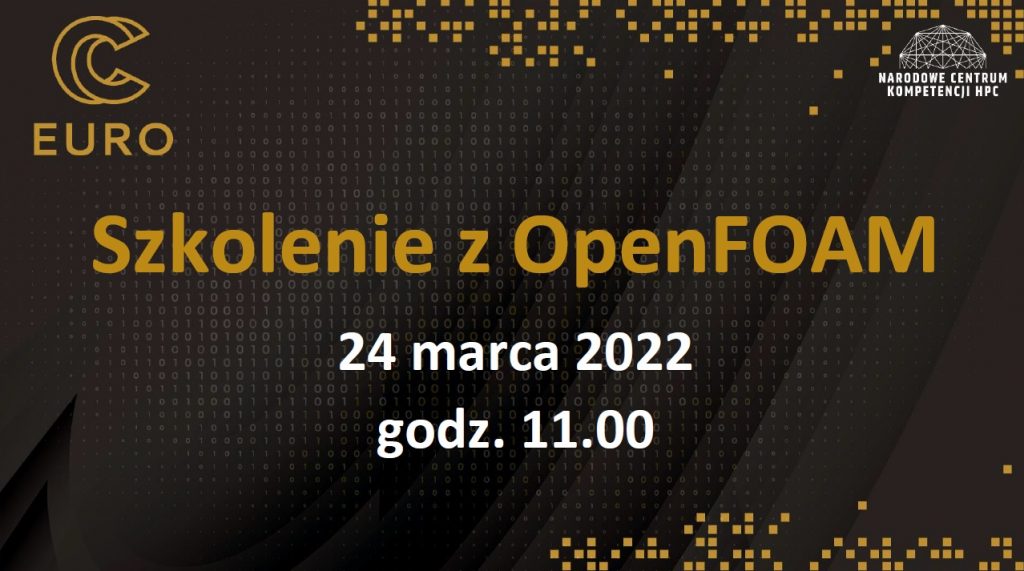
We present a recording from the training titled “OpenFOAM – Computational Fluid Dynamics (CFD) Numerical Simulation Software,” which took place online on March 24, 2022.
The lecture was conducted by Ph.D. Przemysław Błasiak Eng. from Wrocław University of Science and Technology. The training is designed for individuals who have not had prior experience with this software. The agenda includes a brief introduction to the solved equations and finite volume methods; what OpenFOAM is and its purpose; a typical workflow using OpenFOAM; file structure; an introduction to applications and libraries in OpenFOAM; and an example of implementing physical equations in OpenFOAM.
Training: Introduction to Computing on computers ICM
A training session was held on Thursday 20 January 2022, hosted by Michał Hermanowicz from ICM.
The training was aimed at both new and experienced supercomputer users. They learnt about the characteristics of ICM’s computing resources, as well as the basics of how to use them. The topics covered included task ordering for the queuing system, application modules, and selected elements of operating the GNU/Linux environment. Participants were introduced to available resources: Topola, Okeanos and Lynx (GPU/PBaran), as well as the rules for accessing them (logging in, file system / copying data, editing / file operations, utility applications / module system, SLURM queue system), and basic instructions.
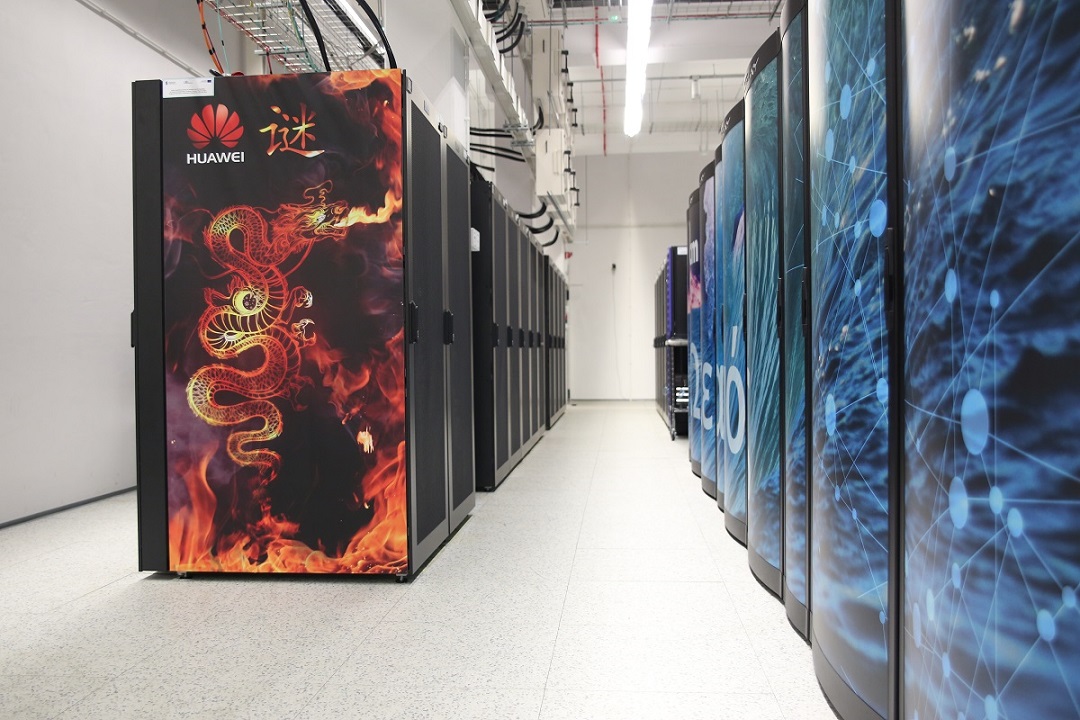
Training: Computing accelerators: GPU, NEC vector computer

Grzegorz Gruszczyński, Michał Dzikowski and Michał Hermanowicz from Interdisciplinary Centre for Mathematical and Computational Modelling UW conducted a training session titled “Computational Accelerators: GPU, NEC Vector Computer,” which took place on December 16, 2021.
In the “Introduction to GPU Computing” block, participants were introduced to the basics of GPU programming using the CUDA toolchain. They learnt about tools such as SIMD (Single Instruction Multiple Data) concept, a single instruction, multiple data, the nVIDIA CUDA architecture model, ‘Hello world’ kernel, and parallel reduction. The instructors also presented the Thrust library that supports algebraic computations.
Meanwhile, the block “Introduction to Vector Computing – NEC SX-Aurora TSUBASA” focused on working with the NEC vector computer. Devices of the SX series emerged in the 1980s as general-purpose supercomputers. A few years ago, they underwent a complete redesign, resulting in the introduction of the SX-Aurora TSUBASA model to the market in 2018. This is a PCIe card that operates under the control of an x86_64 architecture server. The training aimed to familiarise participants with the architecture, capabilities, and specifics of working with the latest NEC vector computer.
Training: GNU/Linux: Bash shell, utilities
A training session was held on Thursday 25 November 2021, hosted by Michał Hermanowicz from Interdisciplinary Centre for Mathematical and Computational Modelling UW.
In addition to an introduction to Unix operating systems and the GNU project, the programme covered topics such as: elements of the GNU/Linux environment (user interface, file system, shell configuration and environment variables), the Bash shell (creating and running scripts, input/output operations, pipeline, conditional instructions and loops, arithmetic operations, data processing), tools: grep, sed, cut, gnuplot, rsync, scp, find. In the practical session, participants had the opportunity to learn shell programming (Bash) and selected utilities.

Training: GNU/Linux: Bash shell, utilities

A training session for new and experienced ICM supercomputer users was conducted on Thursday, 18 March 2021. Michał Hermanowicz from Interdisciplinary Centre for Mathematical and Computational Modelling UW.
Attendees were introduced to the characteristics of ICM’s computing resources, as well as the basics of using them. Topics covered included task ordering for the queuing system, application modules, as well as selected elements of operating the GNU/Linux environment. Participants were introduced to available resources: Topola, Okeanos and Lynx (GPU/PBaran), as well as the rules for accessing them (logging in, file system / copying data, editing / file operations, utility applications / module system, SLURM queue system) and basic instructions.
